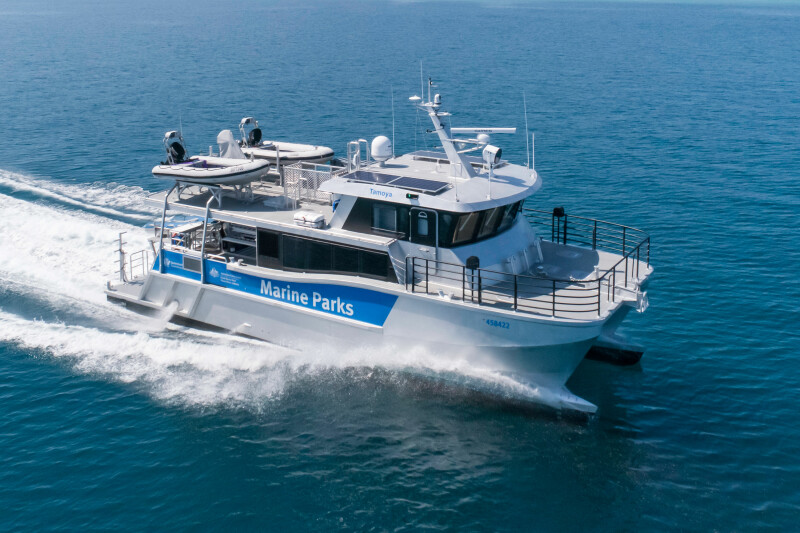Incat Crowther recently announced the launch of Tamoya, an Incat Crowther 17 to join Reef Ranger and Reef Resilience in the Great Barrier Reef Joint Field Management Program fleet. At the same time, Incat Crowther can release further details of a landing craft under construction for the same customer. Norman R Wright and Sons are the project manager and builder of both vessels.
Tamoya packs a lot of punch for her size, which is measured specifically to fit the home port berth. The main deck is dominated by an aft working deck with a quick launch and recovery system for a 3.4m RIB, dive racks, deck winches, BBQ area, a sink and multiple deck lashing points.
Inside the main deck cabin is a wet room, mess, full-size galley and chest freezer. The elevated wheelhouse accommodates the captain’s bunk, while side doors provide direct access to the foredeck. Under the wheelhouse are a pair of twin cabins, with an additional pair of single cabins located aft on the hull deck.
The roof includes ample cargo area suitable for up to two 4.5m RIBs, a deck crane and multiple storage boxes, topping off a highly flexible and functional vessel.
A deck crane allows the loading of cargo onto the roof, as well as answering the call for both on-board RIBs to be launched and recovered easily and safely.
The hull has been specifically designed for the demanding operation and features a new generation Z-Bow, large reserve buoyancy and a nacelle (a streamlined housing or tank) to combat rough seas from south-east trade winds. Developed with operational experience from the existing fleet and computational fluid dynamics (CFD), the new hull has proven itself in recent sea trials.
Energy efficiency is aided by roof-mounted solar panels to maximize the use of available renewable energy and reduce environmental impact.
Built to a high standard that balances weight, robustness, and maintainability, Tamoya is highly efficient and powered by twin MAN i6-850 main engines driving fixed-pitch propellers through ZF V-drive gearboxes. The boat cruises at a service speed of 20 knots. The efficiency translates into range, with the vessel able to be autonomous for up to 10 days at sea with a 500 nautical mile range.
Meanwhile, construction continues on a new Incat Crowther 20 Landing Craft also for the Great Barrier Reef Joint Field Management Program. The vessel will add another string to the bow of the fleet, with beach landing capability combined with a long range and fast cruise speed to significantly improve the programs capacity to manage the 470 island protected areas within the Great Barrier Reef World Heritage Area.
The landing craft provides vehicle access to beaches or boat ramps via a hydraulically operated ramp.
Operations are supported by a reinforced hull bottom for beach groundings, a low hull draft of only one meter, protected propellers and a kedging (light-weight anchor) winch at the stern.
The large working deck is capable of carrying deck cargo and vehicles, such as four-wheel drives, trailers, an excavator, compact track loader or small tractors. In addition to the bow ramp, the vessel will have a UNIC deck crane capable of lifting 680 kg at 7.5 meters.
Twelve passengers can also be accommodated on this working deck on folding seats. Multiple deck lockers also add to the vessel’s functionality.
The wheelhouse deck features a full walkaround, with the aft deck featuring the vessel’s rescue boat and crane, laundry and bathroom. Exterior wing stations forward on this deck afford excellent visibility over the working deck and bow ramp. The wheelhouse features lockers and a single bed.
The main deck cabin includes a twin cabin, a large mess and a fully functional galley. The new boat is also fitted with similar equipment to the larger Reef Ranger and Reef Resilience, with a separate fridge and freezer and a large pantry, alongside ample countertop space. Below decks is a pair of twin cabins and stores.
Powered by an identical MAN propulsion package as Tamoya, the hull offers long-range capability of 500 nm at 20 knots with low engine loading, enabling the Landing Craft to efficiently and effectively deliver construction materials and equipment to remote locations.
For over 40 years, the Queensland and Australian governments’ Reef Joint Field Management Program has planned and executed field operations in the Great Barrier Reef World Heritage Area.
The addition of these new vessels is part of the program’s significant expansion, with additional funding, improved vessels, and more staff to better undertake fieldwork and incident response in the World Heritage Area.
The delivery of the fourth Incat Crowther designed vessel for the Great Barrier Reef Joint Field Management Program fleet follows the company’s maxim of “Your Vision, Our Innovation” by consistently delivering bespoke solutions to support the Great Barrier Reef World Heritage Area.




